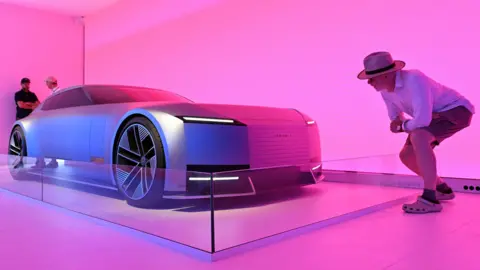In a recent turn of events, former US President Donald Trump has publicly criticized Jaguar Land Rover (JLR) following the company’s announcement of a new CEO amidst its ongoing rebranding efforts. Trump’s comments were made via his popular social media platform, Truth Social, where he described JLR as being in “absolute turmoil” following the resignation of its previous leader, Adrian Mardell, who retired in the week prior. This leadership change comes as JLR embarks on a new direction, which includes significant shifts in branding and product focus, particularly towards electric vehicles.
The incoming CEO, PB Balaji, who has served as the finance chief for Tata Motors—the parent company of JLR—will be stepping into his new role in November, marking a historical transition as he will be the first Indian to hold this position at JLR. Mardell’s tenure was marked by controversy, particularly regarding proposals to retire the quintessential Jaguar logo and predominantly pivot towards producing electric cars. Under Mardell’s leadership, JLR has faced scrutiny, especially with its marketing strategies recently described by Trump as “stupid” and “woke.”
Trump’s critique extended beyond management shake-ups. He compared Jaguar’s recent advertising campaigns to those of American Eagle, a clothing brand that recently gained attention for a viral marketing strategy featuring actress Sydney Sweeney, known for her role in the critically acclaimed series “Euphoria.” Trump lauded American Eagle’s campaign as the “HOTTEST” ad, suggesting that it resonated positively with consumers and potentially benefited from a connection to Sweeney’s reported political inclinations.
In stark contrast, Trump lambasted Jaguar’s most recent advertisements, labeling them a “TOTAL DISASTER” and questioning the appeal of their vehicles to prospective buyers after viewing what he considered a disgraceful marketing effort. This divide in public reception underscores the challenges JLR faces as it tries to reinvent its brand identity amidst shifting consumer preferences towards more modern, sustainable options.
With Balaji’s upcoming leadership comes the responsibility of overseeing JLR’s ambitious plans to launch its first full range of electric vehicles in 2026. Jaguar has embarked on a rebranding initiative that notably includes flashy advertisements featuring models in vibrant attire set against striking desert backgrounds devoid of actual cars or recognizable branding. This departure from their traditional marketing has attracted mixed reactions, with some praising the bold new direction while others have expressed dissatisfaction, labeling it as a deviation from what established Jaguar’s core identity.
Social media responses to the unveiling of the new Jaguar Type 00 concept car illustrated this divide; some users excitedly described the vehicle as “absolutely stunning,” while criticisms have emerged, urging designers to rethink their approach. This polarized response reflects the broader societal themes surrounding luxury branding, representation in advertising, and the ongoing cultural conversations molded by the concept of ‘wokeness.’
As JLR navigates this pivotal period, Balaji’s appointment may be indicative of a willingness to adapt to new market realities while honoring the legacy of Jaguar. However, the firm’s struggle to redefine itself amid changing consumer expectations remains a central narrative. The company’s capacity to effectively balance its historical prestige with progressive market demands may ultimately dictate its fortunes in the increasingly competitive automotive landscape.
With all of this in mind, the spotlight on JLR may intensify as stakeholders will keenly observe how the integration of Balaji’s leadership could reshape the brand’s trajectory. The coming months will reveal whether Trump’s scathing comments have any material impact on public sentiment or consumer interest regarding JLR’s expanding lineup of electric vehicles, which are crucial to its long-term sustainability and success in the industry.












